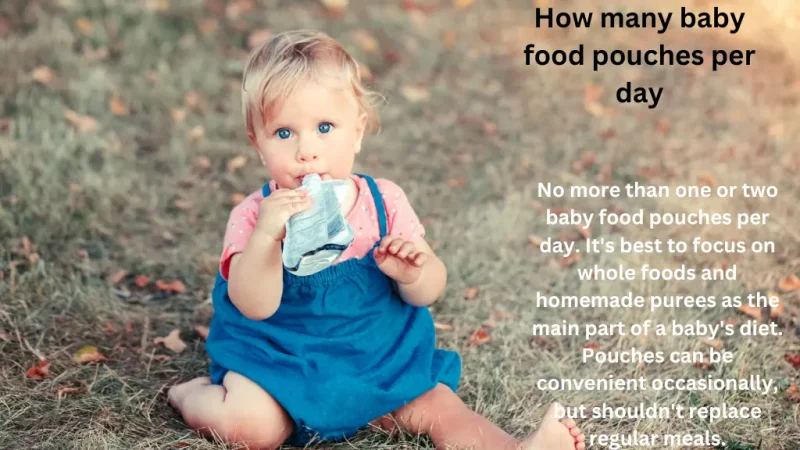How many baby food pouches per day? This question often perplexes new parents as they navigate the world of infant nutrition.
Baby food pouches have become increasingly popular due to their convenience and variety, but determining the appropriate amount to feed your child can be challenging.
Generally, experts recommend no more than one or two baby food pouches per day. This guideline helps ensure that infants receive a balanced diet and develop healthy eating habits.
In this article, we’ll explore the factors that influence pouch consumption, discuss age-appropriate recommendations, and provide tips for incorporating pouches into a well-rounded feeding routine. We’ll also address potential concerns and offer guidance on transitioning to solid foods.

So, How many baby food pouches per day?
No more than one or two baby food pouches per day. It’s best to focus on whole foods and homemade purees as the main part of a baby’s diet. Pouches can be convenient occasionally but shouldn’t replace regular meals.
Age-based recommendations
When it comes to baby food pouches, the appropriate amount varies by age. Here are some general guidelines:
- 4-6 months: At this stage, most babies are just starting solids. Pouches should be used sparingly, if at all. Focus on single-ingredient purees and infant cereals.
- 6-9 months: Introduce pouches gradually. Aim for no more than 1 pouch per day, alongside other forms of solid food and milk feedings.
- 9-12 months: Babies can have 1-2 pouches daily, but ensure they’re also eating a variety of finger foods and thicker textures to develop chewing skills.
- 12+ months: Limit pouches to 1-2 per day maximum. At this age, focus on introducing a wide range of whole foods and textures to promote healthy eating habits.
Remember: These are general guidelines. Always consult with your pediatrician for personalized advice based on your baby’s individual needs and development.
Factors Influencing Baby Food Pouch Consumption:
Age and Developmental Stage
The age and developmental stage of your baby play a crucial role in determining pouch consumption. As babies grow, their nutritional needs and ability to eat different textures change:
- 4-6 months: Typically starting solids, minimal pouch use
- 6-9 months: Increasing variety, pouches can supplement
- 9-12 months: More solid foods, pouches for convenience
- 12+ months: Focus on table foods, limited pouch use
Individual Appetite and Growth Patterns
Each baby’s appetite and growth rate are unique. Some may require more calories during growth spurts, while others may have smaller appetites. Always follow your baby’s hunger cues.
Breastfeeding or Formula Intake
The amount of breast milk or formula your baby consumes affects their need for additional nutrition from pouches. Milk should remain the primary source of nutrition for the first year.
Introduction of Solid Foods
As you introduce a variety of solid foods, the reliance on pouches should decrease. Encourage the exploration of different textures and flavors to promote healthy eating habits.
Parental Convenience and Lifestyle
While pouches offer convenience, especially when traveling or on the go, it’s important to balance this with other feeding methods to support your baby’s developmental needs.
Risks of overreliance on pouches
While baby food pouches offer convenience, overusing them can pose certain risks:
- Nutritional imbalance: Pouches often contain pureed fruits and vegetables, which are high in natural sugars. Overreliance may lead to excessive sugar intake and inadequate exposure to other essential nutrients.
- Delayed oral motor development: Constantly sucking from pouches might hinder the development of chewing skills and delay the transition to more textured foods.
- Limited sensory experience: Babies may miss out on exploring different food textures, colors, and smells, which is crucial for developing a varied palate.
- Potential for overconsumption: The ease of consuming pureed foods from pouches can lead to overeating, as babies may not recognize fullness cues as easily.
- Dental health concerns: Frequent exposure to pureed fruits can increase the risk of tooth decay, especially if consumed between meals.
- Reduced self-feeding skills: Overuse of pouches may limit opportunities for babies to practice using utensils and feeding themselves, which are important milestones in their development.
By being aware of these risks, parents can make informed decisions about incorporating pouches into their baby’s diet while ensuring a balanced approach to feeding.
General Guidelines for Baby Food Pouch Consumption:
While every baby’s needs are unique, the following chart provides general guidelines for baby food pouch consumption based on age:
| Age | Recommended Pouch Intake | Additional Notes |
|---|---|---|
| 4-6 months | 0-1 pouch per day | Introduce pouches gradually alongside solid foods |
| 6-9 months | 1-2 pouches per day | Balance with other forms of solid food |
| 9-12 months | 1-2 pouches per day | Increase variety of textures and whole foods |
| 12+ months | 0-1 pouch per day | Focus on table foods, use pouches as supplements |
Key points to remember:
- These are general guidelines; consult your pediatrician for personalized advice
- Pouches should not replace breast milk or formula as the primary source of nutrition
- Variety is crucial: Rotate flavors and ingredients to expose your baby to different tastes
- Texture matters: Gradually introduce more complex textures to support oral motor development
- Use pouches as part of a balanced diet, not as the sole source of fruits and vegetables
Remember, while pouches are convenient, they should complement rather than dominate your baby’s diet.
Aim to incorporate whole foods and different textures to support your child’s nutritional needs and development.
Balancing Baby Food Pouches with Homemade Foods
While baby food pouches offer convenience, it’s crucial to strike a balance with homemade foods. Here’s how to achieve this:
- Prioritize variety: Offer a mix of pouch foods and homemade options to expose your baby to diverse textures and flavors.
- Set a pouch limit: Aim for no more than 1-2 pouches per day, using them as supplements rather than meal replacements.
- Introduce whole foods: Gradually incorporate soft, whole foods like mashed bananas or avocados to promote chewing skills.
- Make homemade purees: Prepare simple purees at home to control ingredients and reduce reliance on commercial products.
- Use pouches strategically: Reserve pouches for on-the-go situations or as occasional convenient options.
- Encourage self-feeding: Offer finger foods alongside purees to develop motor skills and independence.
- Mimic pouch contents: Create homemade versions of pouch favorites to transition away from commercial products.
By balancing pouches with homemade foods, you’ll provide your baby with a well-rounded diet and support their developmental needs.
Tips for proper pouch usage
When incorporating baby food pouches into your infant’s diet, consider these important guidelines:
- Read labels carefully: Pay close attention to the ingredients and nutritional content. Opt for pouches with simple, whole-food ingredients and minimal added sugars or preservatives.
- Practice portion control: Despite their convenience, pouches shouldn’t replace entire meals. Use them as supplements to a varied diet, not as the main source of nutrition.
- Serve appropriately: Instead of letting your baby suck directly from the pouch, squeeze the contents onto a spoon or into a bowl. This helps develop proper eating skills and allows you to monitor intake.
- Mix it up: Alternate between pouches and whole foods to ensure texture variety and promote oral motor skill development.
- Check expiration dates: Always verify that pouches are within their use-by date before serving.
- Store properly: Once opened, refrigerate pouches and use them within 24 hours to prevent spoilage.
- Introduce new flavors gradually: Use pouches as an opportunity to expose your baby to diverse tastes, but introduce new foods one at a time to watch for potential allergies.
By following these tips, you can make the most of baby food pouches while ensuring your child receives a balanced and nutritious diet.
Conclusion
Baby food pouches can be a convenient option for busy parents, but moderation is key. The general guideline of no more than one or two pouches per day helps ensure a balanced diet for your infant. Remember that pouches should complement, not replace, other forms of nutrition.
As your baby grows, gradually reduce reliance on pouches and introduce a variety of whole foods. This approach supports proper oral motor development and exposes your child to different textures and flavors. Always consult with your pediatrician for personalized advice on your baby’s nutritional needs.
Ultimately, the goal is to foster healthy eating habits that will benefit your child long-term. By using pouches thoughtfully and in conjunction with other feeding methods, you can provide your baby with the nutrients they need while promoting a positive relationship with food.

1 thought on “how many baby food pouches per day?”